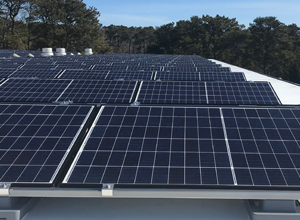Latest Innovation Facilitates Solar Energy Sharing Among UK Neighbourhoods
 Recent development in solar technology enables small communities to share generated energy. Mahmoud Dhimish, an award-winning PhD student at the University of Huddersfield, has been working on this innovation, which intends to reduce energy bills as well. Not only will it distribute energy to neighbouring properties, the system will also make it easier for households to observe and to manage the efficiency of their solar panels. Other experts at the university’s School of Computing and Engineering have been overseeing the research, which utilizes a photovoltaic system installed at the university.
Recent development in solar technology enables small communities to share generated energy. Mahmoud Dhimish, an award-winning PhD student at the University of Huddersfield, has been working on this innovation, which intends to reduce energy bills as well. Not only will it distribute energy to neighbouring properties, the system will also make it easier for households to observe and to manage the efficiency of their solar panels. Other experts at the university’s School of Computing and Engineering have been overseeing the research, which utilizes a photovoltaic system installed at the university.
Currently, around 1.5 million UK homes have solar panel installations, and the figure is expected to reach 10 million homes by 2020. Electricity is being generated from these PV installations, but if households do not utilise all the energy produced, the excess is transferred to a network. Dhimish’s research probes the possibility of distributing the surplus energy to nearby homes instead of exporting it to the network. The challenge however is the varying PV outputs of these solar power generators and different energy consumption of consumers.
To solve this, monitoring units can be developed to detect faults in PV installations and performance. Adjacent houses can share centralized energy storage where monitoring devices are attached for energy distribution. Dhimish is creating a detection system that will make it possible for households to manage and observe solar panel activities. Details of this research can be accessed in the journal, Solar Energy. Mahmoud Dhimish has earned academic awards and a scholarship for his studies in pursuit of renewable energy system.
The forecasted number of 10 million households equipped with solar panels by the end of the decade would mean that a third of UK homes will be generating around 0.6% to as much as 40% electricity from the sun. Other solar power experts say that increased levels of solar panel installation makes the technology more affordable for consumers. In other European countries like Germany, solar power costs about 10 Euro cents per kilowatt per hour. Prices of fossil fuels will remain or soar in the coming years, whereas solar energy costs will continue to drop in the next decade if installation activities continue.
Shift to solar power generation is a great step in achieving a nationwide energy transformation. This however has to be spearheaded by the government’s initiative and continuous subsidies on solar technology and other renewable energy projects that will benefit more UK consumers. In 2011, the state made row-backs on its earlier commitment to subsidize PV installation on more households. Coal-fired plants and old nuclear reactors are still the main producers of electricity in the UK.
On 6th November 2017, the Office of Gas and Electricity Markets announced a possible hike in network charges for UK households having solar panel installations. Households consuming more electricity from the network would be charged more than those using less. Consumers have been utilising electric equipment such as adopters to reduce electricity being drawn from the grid. Discrepancy in energy bills could cause a stir among consumers. Mahmoud Dhimish’s solar technology research can help consumers as it aims to reduce the reliance of individual households on the network.
The UK remains a favourable market for the solar panel industry. You may be one of those businesses promoting shift to renewable energy through solar panel installation or other related products. Let Datablazers Inc. help you connect to more UK households interested in your technology. Contact DBI now for more information on responsive Solar Leads.





